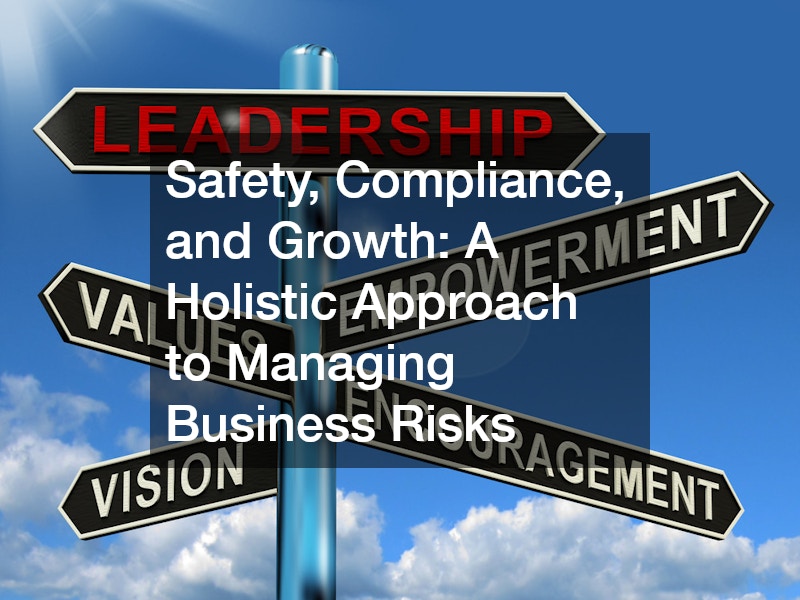Businesses today face a myriad of risks that can significantly impact their operations, safety, compliance, and growth. It’s crucial for business owners to understand the various types of risks and the importance of managing them efficiently. A holistic risk management approach encompasses comprehensive business improvement ideas that cover every aspect of the operation, from waste disposal to intellectual property, to ensure sustainable development and success.
This article aims to provide detailed insights into implementing a holistic risk management strategy. The strategy includes ensuring environmental safety, maintaining aesthetic and structural integrity, navigating financial regulations, enhancing workplace hygiene, protecting intellectual property, streamlining operations, optimizing storage solutions, managing construction debris, addressing health hazards, and ensuring business continuity. By integrating these business improvement ideas, companies can foster a secure and compliant environment that promotes growth.
A thorough understanding of these risk management areas allows businesses to mitigate potential threats effectively. Adopting proactive measures in each domain is a key strategy for achieving long-term stability and growth. Let’s delve into each aspect to understand better how these business improvement ideas can be suitably implemented.
1. Ensuring Environmental Safety
Proper toxic waste disposal is essential for businesses dealing with hazardous materials, as environmental safety should never be compromised. Inadequate waste management can lead to severe contamination of soil and water sources, posing health risks to the public and long-term environmental damage. Beyond the immediate environmental risks, improper handling of toxic waste can damage a company’s reputation, leading to a loss of customer trust and potential backlash from the community.
Business owners should partner with certified waste disposal companies to handle toxic waste safely and efficiently. Certified companies are well-versed in the latest regulations and techniques required for proper hazardous waste disposal. Their expertise helps businesses maintain compliance with environmental laws, thereby avoiding legal implications. Additionally, implementing an internal waste management policy that trains employees on proper disposal procedures can further enhance a company’s commitment to environmental safety.
The legal consequences of improper toxic waste disposal can be detrimental. Non-compliance with environmental regulations might lead to hefty fines, business shutdowns, or legal actions. By prioritizing waste management, businesses not only contribute to environmental conservation but also ensure operational safety and continuity. A proactive approach to managing toxic waste demonstrates corporate responsibility and aligns with broader sustainability goals.
2. Maintaining Aesthetic and Structural Integrity

Selecting a reliable commercial painting contractor is vital for businesses aiming to maintain both the visual appeal and structural safety of their premises. The right painting contractor can significantly impact the property’s longevity and aesthetics, thereby enhancing the overall brand image and attracting more customers. Thorough vetting processes ensure the chosen contractor’s credibility and expertise.
When vetting a commercial painting contractor, ensure they comply with safety standards and employ environmentally safe materials. It’s important that the contractor is adequately licensed and insured to undertake commercial projects. Using eco-friendly painting materials not only benefits the environment but also ensures the safety of employees and customers. To further protect your business, consider drafting a detailed contract that outlines safety protocols, project timelines, and quality expectations. This can prevent disputes and ensure that the project meets your business’s standards.
Well-maintained business facilities reflect positively on the brand, fostering trust and loyalty among customers. A visually appealing and structurally sound establishment can differentiate a business in a competitive market. Therefore, maintaining the premises through regular painting and upkeeping efforts aligns with broader business improvement ideas and risk management strategies. Regular inspections and maintenance schedules should be established to keep the premises in top condition, ensuring that small issues are addressed before they become major problems.
3. Navigating Financial Regulations

Tax accountants play a crucial role in navigating the complex landscape of financial regulations for businesses. Their expertise helps companies comply with tax laws, thus minimizing the risk of legal pitfalls and financial discrepancies. A proactive approach to tax planning can significantly enhance a business’s financial health and stability.
Selecting experienced tax accountants who are well-versed in the latest changes in tax laws is essential. These professionals can offer invaluable strategic tax planning advice that promotes business growth. Additionally, employing effective tax strategies can reduce the likelihood of audits, saving businesses from potential headaches and financial burdens. Business owners should also consider scheduling regular reviews of their financial practices to stay ahead of any changes in tax laws or financial regulations.
Staying updated with ever-changing tax laws is a vital aspect of comprehensive risk management. Regular consultations with tax accountants ensure that businesses remain compliant and leverage any available tax benefits. This partnership is an integral component of a well-rounded approach to business improvement ideas, facilitating growth and sustainability. By creating a long-term relationship with a tax professional, businesses can anticipate future tax liabilities and make informed decisions that support overall financial health.
4. Enhancing Workplace Hygiene
For healthcare-related businesses, selecting high-quality dental cabinets is a paramount consideration for maintaining workplace hygiene. These cabinets play a crucial role in creating a safe and sanitary environment for both staff and patients. Investing in top-tier dental cabinets reflects a commitment to health standards and operational efficiency.
When choosing dental cabinets, businesses should prioritize designs that comply with hygiene and safety standards. Cabinets should be constructed of durable, easy-to-clean materials that prevent contamination and ensure a sterile environment. Additionally, choosing cabinets with antimicrobial surfaces can further reduce the risk of bacteria growth, providing an extra layer of protection. Ensuring that these basic criteria are met protects against health risks and promotes a safe workplace.
The right dental cabinets contribute to compliance with health regulations, which is vital for avoiding legal issues and potential shutdowns. Efficiently designed medical storage solutions enhance the workflow, enabling staff to deliver better care and service. Incorporating high-standard dental cabinetry into your business improvement ideas is an investment in safer, more effective operations. Moreover, well-organized and accessible storage solutions can reduce the time spent searching for tools and supplies, allowing healthcare professionals to focus more on patient care, thereby improving overall service quality.
5. Protecting Intellectual Property

Today’s businesses must guard their intellectual property (IP) vigilantly, and IP attorneys are pivotal in this endeavor. Protecting assets like patents, trademarks, and copyrights is indispensable in safeguarding a company’s competitive edge. Without robust IP protection, businesses risk substantial financial and reputational losses due to theft and infringement.
It’s advisable for business owners to collaborate with IP attorneys to ensure comprehensive protection of their intellectual assets. Attorneys in this field can assist in drafting and securing IP rights, conducting thorough IP audits, and implementing protection strategies tailored to specific business needs. This proactive step helps in mitigating risks and fostering long-term growth.
Regular IP audits are essential for maintaining robust protection of intellectual assets. These audits help in identifying potential vulnerabilities and ensure that IP rights are up-to-date and adequately enforced. Integrated into your business improvement ideas, an IP protection strategy creates a solid foundation for growth and innovation.
6. Streamlining Operations

Modern POS systems are a game-changer in streamlining operations, reducing errors, and enhancing customer experience. Effective use of these systems can significantly increase operational efficiency, helping businesses manage sales, inventory, and customer interactions seamlessly. Implementing advanced POS systems aligns with strategic business improvement ideas aimed at optimizing performance.
Choosing the right POS systems involves selecting platforms that are secure, user-friendly, and compliant with industry standards. It’s important to consider security features to safeguard transaction data and customer information. User-friendliness ensures that employees can operate the system effectively, minimizing errors and enhancing the overall service quality.
POS systems also offer valuable insights by tracking sales data, which can inform better business decisions. Analyzing this data allows businesses to understand customer preferences, manage stock levels more efficiently, and tailor marketing strategies. By integrating effective POS systems, companies can drive growth and foster a more responsive business model.
7. Optimizing Storage Solutions
Effective storage management is a critical aspect of risk mitigation, and pallet racks are fundamental in optimizing warehouse space. These racks provide organized storage solutions that enhance inventory management and operational efficiency. Utilizing pallet racks aligns with business improvement ideas focused on maximizing space usage and minimizing risks associated with disorganized storage.
Businesses should select and maintain pallet racks that meet safety standards, thus preventing accidents and reducing liability. Proper installation and routine inspections are essential to ensure the structural integrity of these storage systems. This approach not only safeguards staff and inventory but also contributes to smoother operational workflows.
Efficient storage management facilitated by pallet racks helps in preventing material handling errors and reducing costs. Organized warehouses improve accessibility and productivity, which supports scalability and growth. Investing in high-quality pallet racks is a practical step in enhancing operational infrastructure as part of a comprehensive risk management strategy.
8. Managing Construction Debris

Proper waste management is crucial during construction or renovation projects, necessitating the strategic use of construction dumpsters. Effective management of construction debris ensures compliance with regulations and minimizes environmental impact. Construction dumpsters play a pivotal role in maintaining site cleanliness and preventing project delays.
When selecting construction dumpsters, businesses should consider the type and volume of waste generated. It’s crucial to partner with reputable waste management services that comply with local regulations. Such partnerships ensure that debris is disposed of correctly, reducing legal risks and environmental hazards.
Effective waste management also contributes to project efficiency. Keeping the worksite clean and organized helps in preventing delays and facilitating smoother operations. Construction dumpsters are integral to comprehensive business improvement ideas, ensuring that projects are delivered on time and within environmental compliance frameworks.
9. Addressing Health Hazards

Asbestos poses significant health risks, making professional asbestos removal services essential for businesses. Exposure to asbestos can lead to severe health issues, emphasizing the need for specialized removal to ensure a safe working environment. Prioritizing health and safety, businesses should integrate asbestos removal services into their risk management strategies.
Choosing certified asbestos removal companies ensures compliance with health and safety regulations. Certified professionals possess the necessary expertise and equipment to handle and remove asbestos safely. This crucial measure helps businesses avoid health risks and legal liabilities associated with improper asbestos management.
The long-term benefits of removing asbestos extend beyond immediate health concerns. A safer work environment reduces liability risks and promotes employee well-being and morale. Incorporating asbestos removal services into your risk management plan is a proactive business improvement idea that safeguards both human and legal interests.
10. Ensuring Business Continuity

Reliable commercial generators are fundamental to maintaining business continuity during power outages. Power interruptions can lead to significant revenue losses and operational disruptions, making backup power solutions a critical investment. Commercial generators provide an essential safety net, enabling businesses to sustain operations seamlessly during unforeseen power failures.
When selecting a commercial generator, consider the specific power requirements and size of the business. Properly sized generators ensure adequate power supply to critical operations without overloading the system. Regular maintenance and testing are also essential to ensure reliability when needed the most.
Investing in backup power solutions can protect businesses from the adverse effects of power outages. Continuity of operations during such interruptions enhances resilience and minimizes potential revenue losses. Including commercial generators in your business improvement ideas demonstrates a commitment to operational stability and preparedness.
Conclusion: Integrating Risk Management into Business Strategy
The importance of a holistic approach to managing business risks cannot be overstated. By adopting comprehensive business improvement ideas, companies can address various operational aspects, ensuring safety, compliance, and sustainable growth. Implementing proactive steps in each area discussed enhances overall risk management and contributes to long-term stability.
Business owners should take diligent actions to integrate effective risk management strategies. Regular reviews and updates to these strategies are essential to adapt to changing business environments. By embedding these practices into their operational frameworks, businesses can mitigate risks effectively and secure their competitive advantage.
A holistic risk management approach not only safeguards against potential threats but also promotes a culture of continuous improvement. Investing in these business improvement ideas leads to a safer, more compliant, and resilient business model. Embrace proactive risk management to unlock sustained growth and operational excellence.






